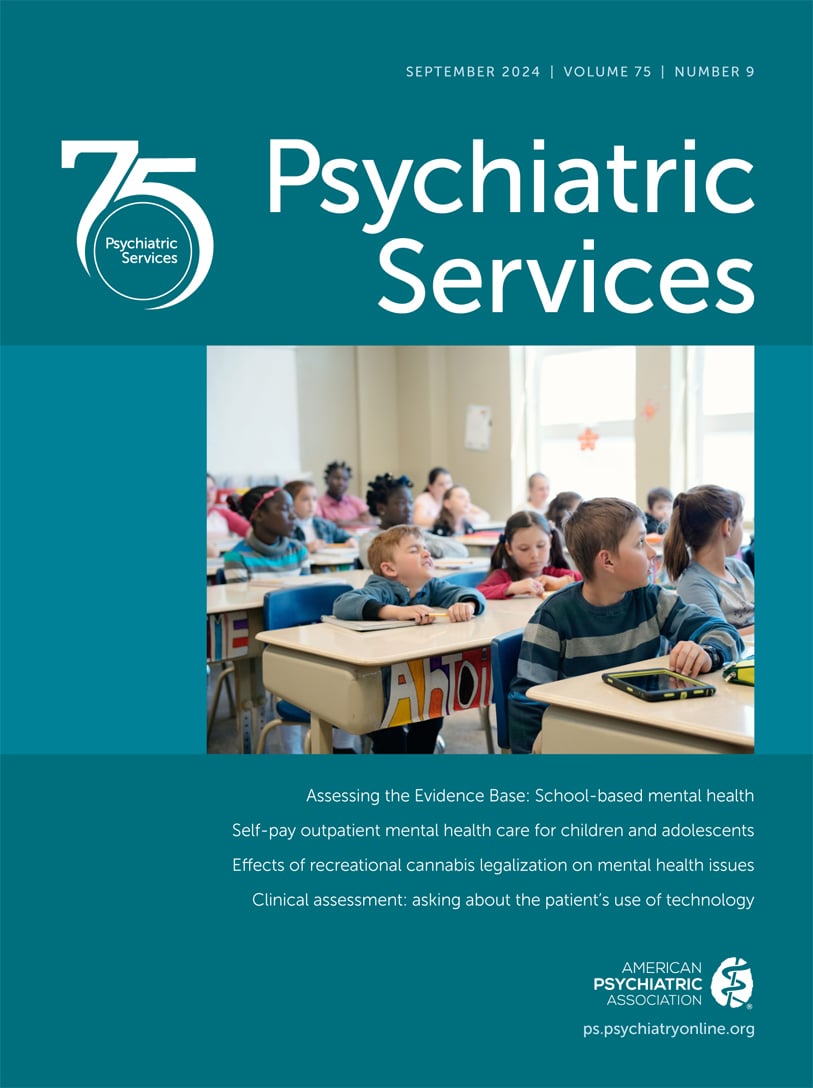Psychiatric Services
- Volume 67
- Number 2
- February 2016
This Month’s Highlights
Taking Issue
Articles
Publication date: 15 September 2015
Pages162–168Objective: In 2008, the federal Mental Health Parity and Addiction Equity Act (MHPAEA) passed, prohibiting U.S. health plans from subjecting mental health and substance use disorder (behavioral health) coverage to more restrictive limitations than those ...
https://doi.org/10.1176/appi.ps.201400575Publication date: 15 October 2015
Pages169–175Objective: Repeated hospitalizations and arrests or incarcerations diminish the ability of individuals with serious mental illnesses to pursue recovery. Community mental health systems need new models to address recidivism as well as service fragmentation, ...
https://doi.org/10.1176/appi.ps.201300482Publication date: 01 December 2015
Pages176–183Objective: Computer-based psychotherapy interventions (CBPIs) are increasingly offered as first-level access to evidence-based mental health treatment. However, their implementation has not been evaluated in public-sector outpatient settings. Methods: An ...
https://doi.org/10.1176/appi.ps.201400532Publication date: 15 September 2015
Pages184–191Objective: Early intervention services (EISs) for mental illness may improve outcomes, although treatment engagement is often a problem. Incorporating patients’ preferences in the design of interventions improves engagement. A discrete-choice conjoint ...
https://doi.org/10.1176/appi.ps.201400306Publication date: 15 October 2015
Pages192–198Objective: Latino families may be at risk of experiencing stressors resulting from the immigration process, such as those related to documentation status and acculturation, that may increase their need for mental health services. However, little research ...
https://doi.org/10.1176/appi.ps.201400444Publication date: 01 October 2015
Pages199–205Objective: This study estimated the proportions of Hispanic and non-Hispanic white and black children ages three to 17 with a diagnosis of attention-deficit hyperactivity disorder (ADHD) receiving services from the New York State public mental health ...
https://doi.org/10.1176/appi.ps.201400364Publication date: 01 December 2015
Pages206–213Objective: The main objective was to identify which patient characteristics have the strongest association with suicide outcomes in the 12 months after an index emergency department (ED) visit. Methods: Data were analyzed from the first two phases of the ...
https://doi.org/10.1176/appi.ps.201400513Publication date: 01 October 2015
Pages214–220Objective: Stakeholders have expressed concern over the appropriate use of psychiatric medications and adequacy of mental health services for youths involved with the juvenile justice system. This study assessed the impact of implementing psychiatric ...
https://doi.org/10.1176/appi.ps.201400544Publication date: 01 October 2015
Pages221–226Objective: This study examined sources of help (providers or nonproviders) used by soldiers for mental health problems. Differences in perceived barriers to care by type of help used were also assessed. Methods: Active-duty soldiers from four brigade combat ...
https://doi.org/10.1176/appi.ps.201400519Publication date: 15 October 2015
Pages227–233Objective: First-episode psychosis has an annual incidence rate of 24.6 to 40.9 per 100,000 population, and most individuals develop chronic disorders, such as schizophrenia or affective psychosis. The first two to five years are thought to be key ...
https://doi.org/10.1176/appi.ps.201400316Brief Reports
Publication date: 15 September 2015
Pages236–239Objective: Various models of peer support may be implemented in mental health settings. This randomized trial assessed the effectiveness of a telephone-delivered mutual peer support intervention. Methods: A total of 443 patients receiving ongoing depression ...
https://doi.org/10.1176/appi.ps.201400454Publication date: 01 October 2015
Pages240–243Objective: Active-play video games have been used to enhance aerobic fitness in various clinical populations, but their use among individuals with schizophrenia has been limited. Methods: Feasibility, acceptability, safety, and adherence data were obtained ...
https://doi.org/10.1176/appi.ps.201400523Publication date: 02 November 2015
Pages244–247Objective: This study examined how accurately inpatient case managers predicted 30-day readmission and whether objective patient characteristics improved prediction accuracy. Methods: In this prospective study, inpatient case managers at a psychiatric ...
https://doi.org/10.1176/appi.ps.201400282Publication date: 02 November 2015
Pages248–251Objective: Feature articles in the Medical Surveillance Monthly Report (MSMR) reflect the U.S. military’s health surveillance priorities. This study examined whether the recent rise in the number of ambulatory encounters for mental disorders in the U.S. ...
https://doi.org/10.1176/appi.ps.201500001Open Forum
Publication date: 02 November 2015
Pages234–235Ninety percent of the determinants of our health derive from our lifetime social and physical environment—not from the provision of health care. The author describes behaviors, such as poor eating, excessive drinking and abuse of drugs, smoking, and ...
https://doi.org/10.1176/appi.ps.201500232Datapoints
Best Practices
Publication date: 15 October 2015
Pages153–155This column discusses “cultural activation,” defined as a consumer’s recognition of the importance of providing cultural information to providers about cultural affiliations, challenges, views about, and attitudes toward behavioral health and general ...
https://doi.org/10.1176/appi.ps.201500278Case Studies in Public-Sector Leadership
Economic Grand Rounds
Publication date: 02 November 2015
Pages159–161Financing has been hypothesized to be an important driver of the implementation of evidence-based practices (EBPs), yet there has been little systematic investigation of financing as a factor in EBP implementation. This column presents findings from a ...
https://doi.org/10.1176/appi.ps.201500392Book Reviews
News & Notes
Past Issues
View Issues Archive
Vol. 75 | No. 12

Vol. 75 | No. 11

Vol. 75 | No. 10
